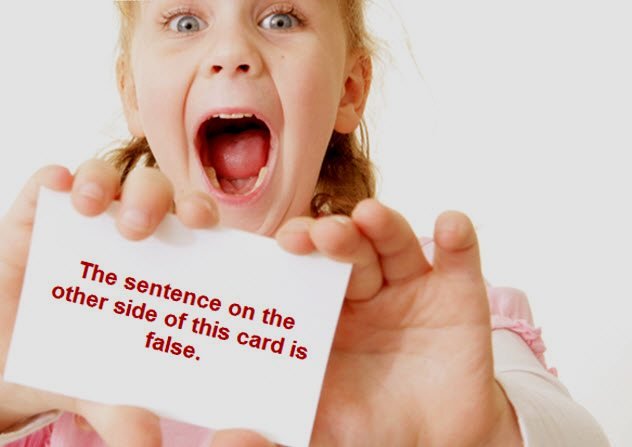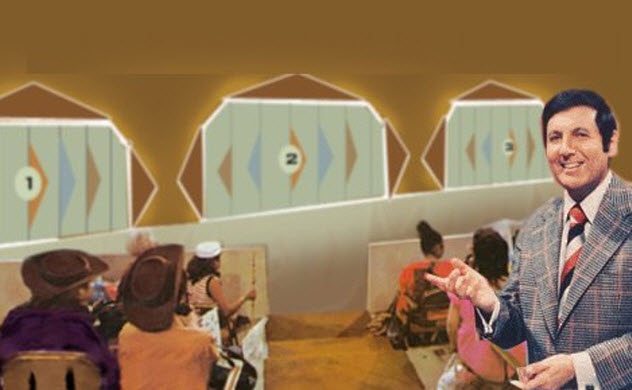Brisk, get out your Rubik's Cube! Mind riddles, brainteasers, or whatever you may call them are frequently fun and in some cases addictive. Consistent mysteries are preposterous explanations that bode well but don't in the meantime.
Here's a great case of a fun little brainteaser called "The Paradox of Omnipotence" that has been perplexing personalities for quite a long time: Could God, being reliable and transcendent, influence a stone so overwhelming that to even He couldn't lift it? By what method can an element be all-powerful (all-effective) and make something which discredits His own particular supremacy?
Another incarnation of a similar inquiry goes, "Could Jesus microwave a burrito so hot that even He couldn't eat it?" You can think about the responses to these confusing inquiries while we cover 10 of the most madly fun consistent riddles ever. (Try not to stress, we picked simple ones that pretty much anyone can get it.)
Spoiler Alert: If you haven't seen the exemplary Star Trek scene "I, Mudd," don't watch the video in section nine. You've been cautioned.
10 The Heap
Photograph credit: Simon A. Eugster
We should go back to the fourth century BC and begin with Eubulides of Miletus, the man who is credited as the innovator of mysteries. Eubulides concocted four fun brainteasers that require watchful reasoning to settle.
The Heap (otherwise known as The Sorites Paradox) is the first of these traditional conundrums, and it's an issue of degrees:
In the event that a man has zero hairs on his head, we say he's uncovered. Be that as it may, a man who has 10,000 hairs on his head isn't thought to be bare. Be that as it may, imagine a scenario where we add a solitary hair to the leader of the man with zero hairs. He would in any case unmistakably be uncovered.
Presently suppose that a man has 1,000 hairs as it were. Be that as it may, the strands are equally separated and extremely thin. Would this man be uncovered or not bare?
Would you consider a solitary grain of wheat a "store of wheat?" Definitely not. What about two grains? All things considered, most likely not. So when complete a couple of grains or a couple of hairs end and an entire store or hairlessness really begin?[1]
The issue is one of dubiousness. Where does one portrayal end and another start?
9 The Liar Paradox
The main sentence of this section is a lie. Stop and consider that sentence for a moment. Is it valid? Or on the other hand a lie? A genuine lie? This is known as The Liar Paradox, and it's additionally from the season of Eubulides. It's direct and fun and appears as one short explanation: "This sentence is a lie." Another incarnation of the mystery is: "All that I say is false."
The issue with the two articulations: They're valid, yet they negate themselves if that is so. In what manner can a genuine proclamation repudiate itself? Wouldn't that make it both genuine and false in the meantime?
In the event that either citation above is extremely a lie, at that point that announcement is valid and repudiates itself. Much more dreadful, if each other explanation beforehand articulated by the speaker is false, at that point this one sentence, "All that I say is false," is a genuine sentence and negates itself.[2]
All in all, what do you think? Is the sentence a lie?
8 Limited And Unlimited
Photograph credit: NBC News
The following oddity originates from a man named Zeno of Elea who lived around 495– 430 BC. He thought of many brainteasers which are as yet astounding right up 'til today. Have you at any point pondered about the likenesses we find in nature from little to expansive? Have you at any point suspected that possibly, quite possibly, our entire universe is extremely only a minor iota in the universe of some significantly bigger element?
Zeno needed to demonstrate that the possibility of a majority of things (which all exist one next to the other in time and space) carried with it some genuine consistent irregularities. The Limited And Unlimited Paradox showed this. Does one thing exist or numerous? What isolates one thing from the following? Where is the line?
This is likewise called The Paradox of Density, and how about we put it a little in an unexpected way. This works with numerous articles, yet we'll begin with only two. On the off chance that there are two things, what isolates them? You require a third thing to isolate the two.
The Paradox of Density happens on a wide range of scales, yet you get the fundamental thought. Things being what they are, is there only one gigantic substance called the universe that contains undefined matter of shifting densities (air, the floor, a tree, and so on.)?
Is all issue ceaselessly distinct? Or on the other hand in the event that we partition matter into objects sufficiently little, will we in the long run achieve the protest so little that it can't be divided?[3]
The sharpest logical personalities of mankind still think about these inquiries today.
7 The Dichotomy Paradox
This great jewel, The Dichotomy Paradox, additionally originates from Zeno. From this brainteaser about separation and movement, Zeno made the inference that all movement is really unthinkable. Like the Limited And Unlimited Paradox, this arrangements with division that turns out to be ceaseless.
Suppose that you choose to stroll to the store and purchase a pop. For you to arrive, you'll need to cross the midpoint. Don't sweat it, this bodes well. Be that as it may, from the midpoint, you'll need to next cross the midpoint of the midpoint (seventy five percent of the path from your home to the store). At that point you'll need to cross the midpoint of that separation and the midpoint of the following littler separation.
So hold up a moment. On the off chance that you continue separating your stumble into midpoints, you'll never really be over the midpoint . . . ever. How is this conceivable? You realize that you can go to the store and get a pop. Yet, when do you really cross the last midpoint (where there are not any more most of the way points)?[4]
Zeno appeared to be fixated on this inquiry of where we take a stand. At the point when are you in reality inside the store?
6 Achilles And The Tortoise
Another brainteaser originates from Zeno as Achilles and the Tortoise, which is like The Dichotomy Paradox. In this perplex, Achilles races a tortoise. To be a pleasant person (demigod), Achilles gives the tortoise a 100-meter (328 ft) head begin since Achilles is a greatly quick sprinter and the tortoise is . . . well . . . a tortoise.
When the weapon shoot and the race starts, Achilles rapidly surrounds the moderate moving tortoise. In a matter of seconds, Achilles has crossed the 100 meters (328 ft) of the head begin that he gave the tortoise.
All the while, the tortoise has voyage 10 meters (33 ft). So Achilles still hasn't gotten the tortoise. Be that as it may, once more, Achilles will rapidly shut in, crossing the extra 10 meters (33 ft). Amid this time, be that as it may, the tortoise has voyage another 1 meter (3 ft).
By this rationale, Achilles can never really get the tortoise, can he?[5] How would this be able to be conceivable? Each time he gets nearer, the tortoise goes further. Does this imply movement itself is incomprehensible despite the fact that we encounter it day by day?
That is the thing that Zeno pronounced. We'll give you a chance to choose.
5 The Paradox Of Inquiry
The Paradox of Inquiry (otherwise known as Meno's mystery) was highlighted in Plato's discoursed. Meno gets into a talk about uprightness with Socrates that prompts an unconventional inquiry regarding how we learn. In the event that we don't know what we don't have the foggiest idea, how would we know what to search for?
At the end of the day, in the event that we need to discover something that we don't have the foggiest idea, how would we know what to inquire? Regardless of whether we happen to experience what we don't know by possibility, we wouldn't know it and wouldn't know to ask. This would imply that we never really get the hang of anything by making inquiries—which is clearly crazy. Addressing is the major start of science and the initial phase in the logical strategy.
As Meno stated, "And by what method will you ask into a thing when you are entirely uninformed of what it is? Regardless of whether you happen to knock directly into it, by what method will you know it is the thing you didn't have even an inkling?" Socrates rethought the Catch 22 along these lines: "A man can't look either for what he knows or for what he doesn't have the foggiest idea. He can't scan for what he knows—since he knows it, there is no compelling reason to seek—nor for what he doesn't have a clue, for he doesn't recognize what to look for."[6]
In the event that we know the response to the inquiry we ask, how would we take in anything from inquiring?
4 The Double Liar Paradox
We should climb to more present day times and toy with a fun augmentation of The Liar Paradox called The Double Liar Paradox. To start with conjured up by mathematician P.E.B. Jourdain, this brainteaser goes as takes after: Take a blaze card or a bit of paper. On one side, state: "The sentence on the opposite side of this card is valid." Now flip it over and compose on the opposite side: "The sentence on the opposite side of this card is false."[7]
On the off chance that the second sentence is valid, at that point the primary sentence is false. (Flip the card.) Here, you wind up moving into an uncertain changing of sides—side A to side B on the card. Be that as it may, if the sentence you initially composed is false, as the second sentence claims, at that point the second sentence would likewise be false. Accordingly, the two sentences are good and bad in the meantime. Mess around with that one.
3 The Monty Hall Problem
Photograph credit: pathofthebeagle.com
This one can be seen on diversion indicates all over the place. Suppose there are three entryways. Behind each of two entryways is a block, however one entryway veils $1 million. You get the opportunity to pick an entryway and check whether you win the million.
We should assume you pick Door An and seek after the million. At that point the diversion demonstrate have opens another entryway at arbitrary to check whether you won or lost. The host picks Door B, and it uncovers a block. With Door B off the beaten path, the 33% chances just improved.
You're left to pick between Door An and Door C. You can even change to Door C now in the event that you need. Since you don't comprehend what is in reality behind your entryway, despite everything you're picking between two entryways. So your chances are 50/50, isn't that so? Entryway A, Door C . . . it's one out of two . . . can't get any less complex than this. Off-base.
Now, it sounds unreasonable to state that you have a 66% possibility of getting the $1 million in the event that you switch entryways and a 33% shot if y







Thanks for your good posts, I followed you!
Downvoting a post can decrease pending rewards and make it less visible. Common reasons:
Submit